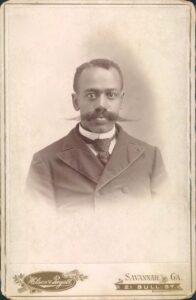
Abraham Lincoln DeMond
*Abraham Lincoln DeMond was born on this date in 1867. He was a Black minister and civil rights advocate in the late 19th and early 20th centuries.
Born in Seneca, New York, DeMond was the son of Quam and Phebe (Darrow) DeMond. He was the first black graduate of the State Normal School at Cortland, New York, now known as SUNY Cortland, and later studied theology at Howard University. He married Lula Watkins Patterson, a graduate of Selma University and a music teacher. They had five children, all born between 1902 and 1908: teacher Ruth DeMond Brooks, Albert Laurence DeMond, William Arthur DeMond, Charles Gordon DeMond, and Marguerite Lula DeMond (wife of journalist John P. Davis).
On January 1, 1900, at Dexter Avenue Baptist Church, he gave a speech, The Negro Element in American Life, his only published work. The Dexter Avenue Baptist Church, later in the early 1960s, became known as the church of the American Civil Rights Movement. In his speech, DeMond reviewed black history as a map for the American nation's future. He identified the Declaration of Independence and the Emancipation Proclamation as the twin pillars of the American Republic, the latter constituting fulfillment of the former. He stated that the Emancipation Proclamation enabled African Americans to participate in loyal patriotism, and he lauds the contributions of Black soldiers in the Spanish American War. He paid tribute to many antislavery figures for voicing a desire for freedom that informed the re-fashioning of the United States.
He thought American history was informed by three basic characters: "the Cavalier, the Puritan, and the Negro." He praised African Americans for contributing "all that is noblest and best in American life." He incorporated the rhetoric of the antislavery movement into early 20th-century nationalist discourse on freedom and the United States' destiny. The Emancipation Proclamation Association sponsored the publishing of DeMond's speech as a pamphlet. DeMond emphasized that African Americans are thoroughly American, not African, and therefore fully deserving of all the rights of citizens.
DeMond described the Declaration of Independence and the Emancipation Proclamation as: "Two great patriotic, wise and humane state papers…Both were born in days of doubt and darkness. Both were the outcome of injustice overleaping the bounds of right and reason. One was essential to the fulfillment of the other. Without the Declaration of Independence, the nation could not have been born; without the Emancipation Proclamation, it could not have lived."
DeMond served as a pastor in Fort Payne, Alabama; Dexter Avenue Baptist Church in Montgomery, Alabama; Plymouth Congregational Church of Charleston, South Carolina; the First Congregational Church of Buxton, Iowa; and the First Congregational Church of New Orleans. Abraham L. DeMond died on January 19, 1936.